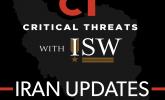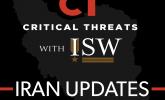Russian Offensive Campaign Assessment, May 3, 2023
May 3, 2023 - ISW Press
Russia accused Ukraine of conducting a drone strike against the Kremlin on May 3. Social media footage circulated on May 3 shows a drone detonating near a flagpole on top of the Kremlin Senate Palace building in Moscow as two unidentified people climbed up the dome of the building. The Kremlin accused Ukraine of orchestrating “a planned terrorist attack” with the intent of assassinating Russian President Vladimir Putin and clarified that Putin was not at the Kremlin at the time of the attack and was therefore unharmed. Ukrainian officials, including Ukrainian President Volodymyr Zelensky, stressed that Ukraine did not conduct the attack.










